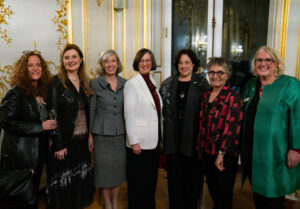
The UNESCO Chair on Artificial Intelligence and Human Rights was established in March 2024 at the American University of Paris. The Chair advances UNESCO’s role as a catalyst for innovative thinking by fostering cutting-edge research and impactful educational initiatives, notably through The American University of Paris’s Master’s degree in Human Rights and Data Science, while actively participating in UNESCO’s broader programmatic activities and events.
The chair holders, Professors Claudia RODA and Susan PERRY, are supported by a multidisciplinary team of experts and scholars, comprising:
- Constance Pâris De Bollardière – Schaeffer Center for the Study of Genocide, Human Rights and Conflict Prevention
- Jeff Gima – Amical consortium
- Marco Pascucci – Professor of Computer Science, The American University of Paris
- Brian Schiff – Schaeffer Center for the Study of Genocide, Human Rights and Conflict Prevention
- List to be completed soon
Susan Perry is a specialist in international human rights law and digital technology. She teaches law and politics at The American University of Paris, where she directs several of the university’s graduate programs and the Summer Institute for Human Rights. Susan is a member of the French National Human Rights Commission (CNCDH) and serves as Vice President for the sub-commission on International Humanitarian Law. Both a scholar and activist, Susan’s work focuses on vulnerable populations .
Claudia Roda is professor of Computer Science, director of the master’s program in Human Rights and Data Science, and former Dean at the American University of Paris. She is a member of the Research Advisory Board of the International Association of Privacy Professionals, and serves on the European Commission’s expert group for the definition of the first General-Purpose AI Code of Practice. Claudia’s work has been generously sponsored by several organizations and is widely published. .
Supporting UNESCO’s actions to implement the Recommendation on Ethics of Al, and the advancement of other instruments on the ethics of science and technology.
In support of UNESCO’s path-breaking Recommendation on the Ethics of Artificial Intelligence (2022), The Chair on Artificial Intelligence and Human Rights promotes an interdisciplinary approach to analyzing and applying UNESCO’s principles for the ethical use of AI. The Chair is particularly attentive to gender equality in supporting innovation in science and technology and can contribute to UNESCO’s Strategy for Gender Equality in and through Education with targeted research and knowledge production about education on Artificial Intelligence and Human Rights.
